Hiring bilingual professionals in Japan is a common challenge. Language skills alone are not enough; companies need individuals with cultural fluency, adaptability, and industry knowledge. So how can companies find talent that meets these demands? In this article, our industry-specialized consultants share key strategies, tips, and real-world examples for recruiting and hiring bilingual professionals.
Key Highlights
Bilingual talent with specialized skills is rare and in high demand
Professionals who combine language ability with technical or commercial expertise are limited in Japan
Especially scarce in sales and engineering roles
Scarcity leads to higher hiring costs and longer recruitment timelines
Unclear criteria increase mismatches and delays
Clear internal alignment is essential
HR and hiring managers must agree on where, how, and to what extent language skills are needed
Clearly define required language proficiency and acceptable trade-offs
Alignment reduces confusion and improves hiring outcomes
Specialized recruitment agencies help bridge expectations and access talent
Agencies with market expertise align global and regional hiring goals
They clarify role requirements and provide access to passive bilingual candidates
General job boards rarely reach these professionals
Table of Contents
Defining Your Ideal Bilingual Candidate
The Reality of Bilingual Talent in Japan
Pharmaceutical Industry Bilingual Recruitment and Hiring Insights
Pharmaceutical Industry Candidate English Proficiency by Age (Apex Data)
Medical Device Industry Bilingual Recruitment and Hiring Insights
Medical Device Industry Candidate English Proficiency by Age (Apex Data)
IT Industry Bilingual Recruitment and Hiring Insights
IT Industry Candidate English Proficiency by Age (Apex Data)
Life Science Industry Bilingual Recruitment and Hiring Insights
Life Science Industry Candidate English Proficiency by Age (Apex Data)
Legal & Compliance Bilingual Recruitment and Hiring Insights
Legal & Compliance Candidate English Proficiency by Age (Apex Data)
Back Office Bilingual Recruitment and Hiring Insights (HR, General Affairs, Finance & Accounting)
Back Office Candidate English Proficiency by Age (Apex Data)
Key Takeaways for Successful Bilingual Recruitment
Apex’s Strengths in Bilingual and Global Talent Recruitment
Defining Your Ideal Bilingual Candidate
Bilingualism Goes Beyond Language
Focusing only on language skills is not enough. Companies need professionals who can operate effectively in international environments and contribute beyond translation. Ideal candidates often demonstrate:
Experience working with global teams and managers, showing strong intercultural understanding and collaboration
A global mindset that adds perspective and balance to domestic operations
Practical ability to engage with overseas offices or partners and support cross-border business
Negotiation skills to manage both local and international interests
Deep knowledge of the local market, especially useful for companies entering Japan
Bilingual Does Not Mean Interpreter
Many companies assume that bilingual talent must act as interpreters. This often leads to mismatches. Instead, define what the role truly requires. When assessing candidates, focus on three areas:
Skills: Relevant technical or functional expertise
Experience: Industry background and project history
Cultural Fit: Compatibility with your company’s values and work style
The Reality of Bilingual Talent in Japan
Bilingual professionals in Japan must offer more than language skills. They need intercultural awareness, adaptability, and deep industry expertise. Despite strong demand, this talent remains difficult to find.
According to the Ministry of Economy, Trade, and Industry (METI), over 70 percent of Japanese and foreign-affiliated companies recognize the strategic need to hire professionals with both specialized knowledge and hands-on experience. However, only 25 percent succeed in meeting their hiring targets.
Why is Recruiting Foreign Talent in Japan Difficult?
Companies in Japan face several recurring challenges when hiring foreign professionals:
Japanese Companies:
Difficulty aligning skills, roles, and compensation (28%)
Communication issues within Japanese business settings (27%)
High compensation expectations (19%)
Foreign-Affiliated Companies:
Communication issues within Japanese business settings (31%)
Difficulty aligning skills, roles, and compensation (15%)
High compensation expectations (9%)
Cultural acceptance of foreign employees (9%)
These results point to persistent language barriers and structural differences between Japan’s membership-based employment system and the job-specific hiring practices common in Western firms.
How Foreign-Affiliated Companies Successfully Hire Bilingual Talent in Japan
Foreign-affiliated companies in Japan often face difficulty securing professionals with advanced bilingual skills. Hard-to-fill roles commonly include:
Bilingual specialists in pharmaceuticals and medical devices (India)
IT professionals in services and retail sectors (Taiwan)
Engineers and communication experts in the tech industry (Finland)
Senior executives such as CEOs and CSOs in life sciences (Germany)
Sales professionals in the ICT sector (Denmark)
Regulatory and compliance specialists in technology fields (France)
To overcome these challenges, many companies turn to specialized recruitment agencies. According to the Ministry of Economy, Trade, and Industry (METI), 72 percent of foreign-affiliated companies in Japan successfully hired their target talent through agency support.
Understanding the differences in recruitment processes between Japanese and foreign companies is essential when hiring bilingual professionals. This clip from our podcast delves into how these differences can impact the hiring experience and provides insights into navigating them effectively.
Watch the full episode: “Motivating Factors Beyond Salary & Recruitment Process Challenges”.
Pharmaceutical Industry Bilingual Recruitment and Hiring Insights
Satoru Kudo
Pharmaceutical Team Manager. Specializes in clinical development, regulatory affairs, safety, and quality assurance. Selected as one of the company’s top consultants in 2023.
Key Challenges in Recruiting Bilingual Pharmaceutical Talent
The global nature of the pharmaceutical industry requires professionals with strong English skills and deep expertise in areas such as regulatory affairs, pharmacovigilance, clinical development, and medical affairs.
High Competition for Limited Talent
Candidates who combine industry knowledge with English proficiency are scarce. Demand is high, and the best candidates must also align with salary expectations, age profiles, and company culture.
The Language and Expertise Gap
For mid to senior-level professionals, balancing English proficiency with specialized responsibilities is difficult. Pharmaceutical English involves complex terminology and strict regulatory language, making fluency harder to achieve.
Effective Bilingual Recruitment Strategies
Differentiate Hiring Criteria to Stand Out
Clear internal alignment between HR, hiring managers, and leadership is essential. Distinguishing between must-have and flexible requirements allows companies to move faster and attract better candidates.
Offering differentiated hiring conditions can give your company a competitive edge. Consider:
Adjusting age limits or reevaluating retirement policies
Expanding job locations beyond Tokyo, such as into the Kansai region
Increasing salary ranges where appropriate
Strategic flexibility in these areas can be the key to securing top bilingual talent.
Pharmaceutical Industry Candidate English Proficiency by Age (Apex Data)
Apex offers a diverse range of bilingual pharmaceutical candidates across various proficiency levels and age groups, helping companies efficiently match specific hiring needs.
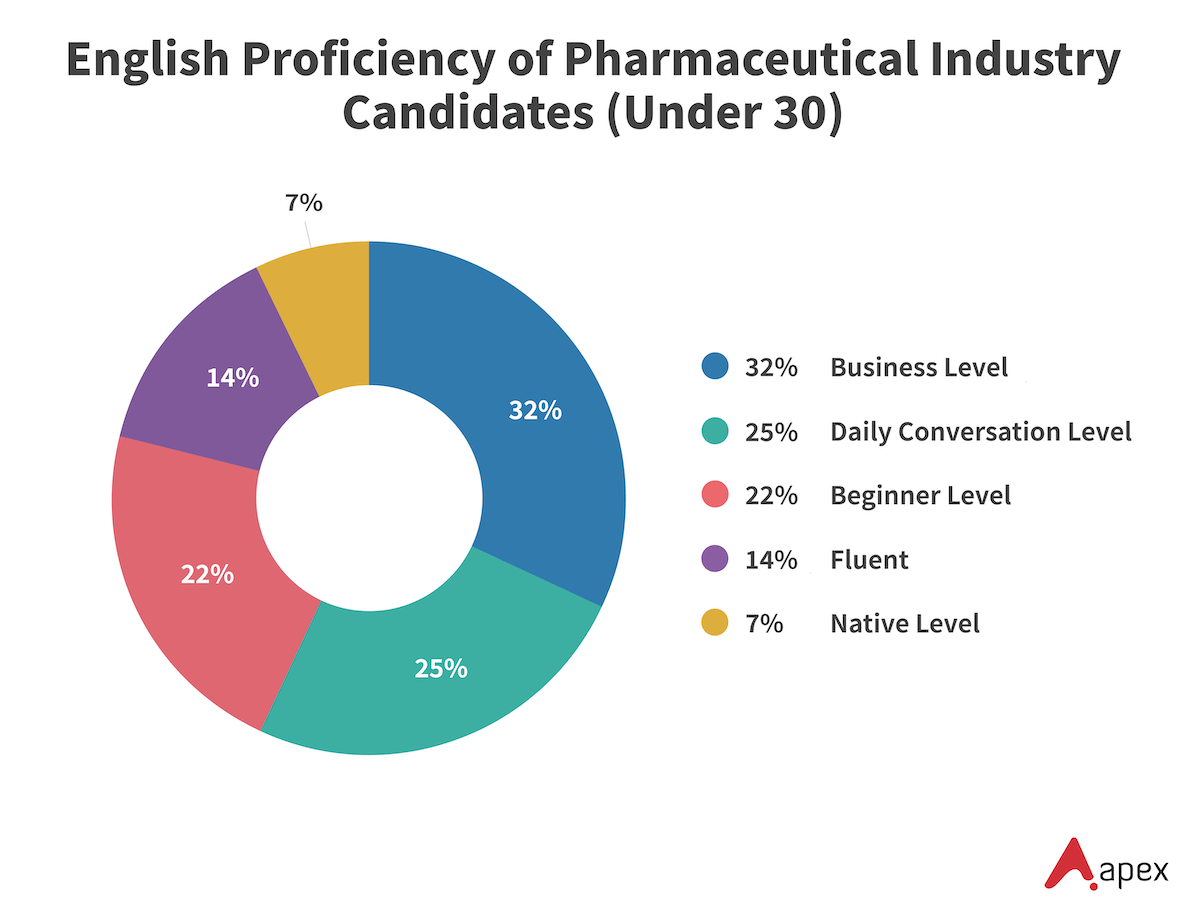
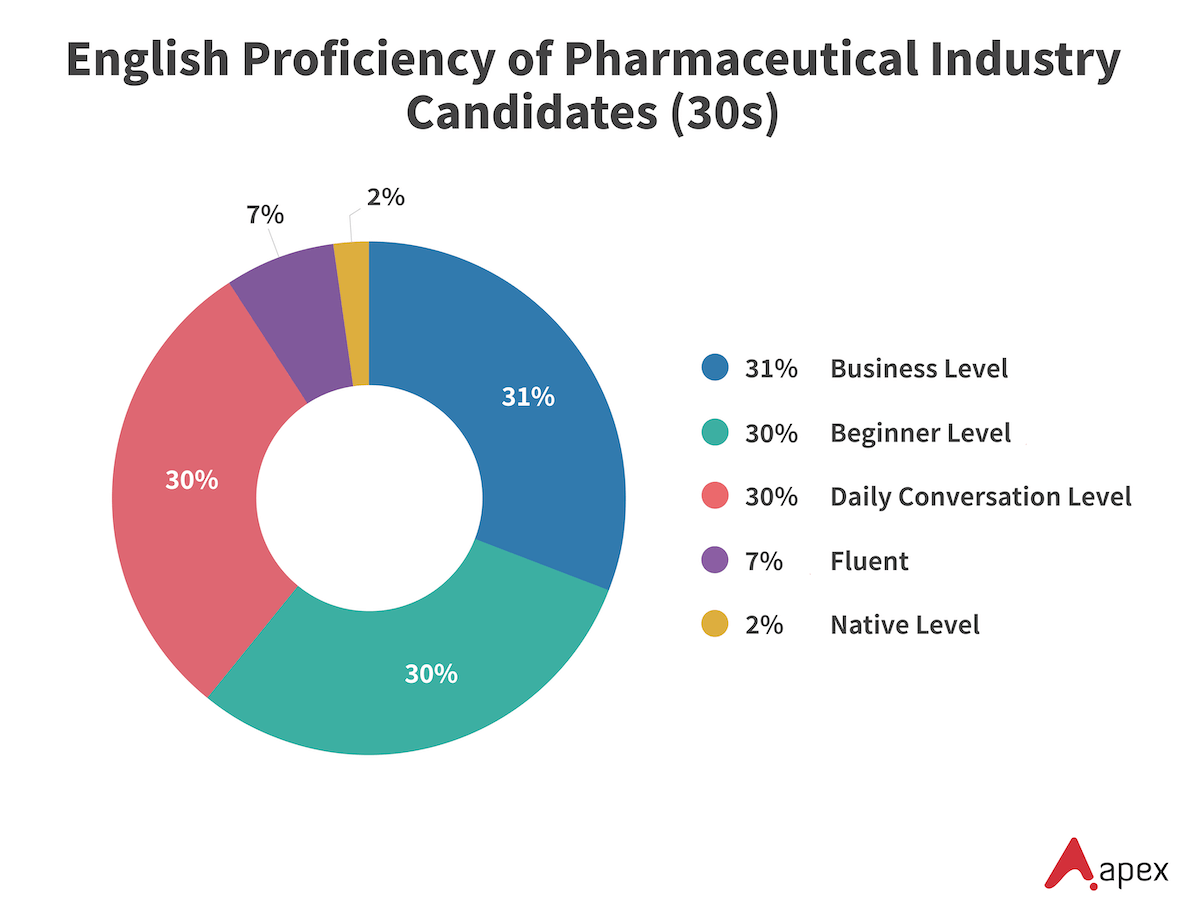
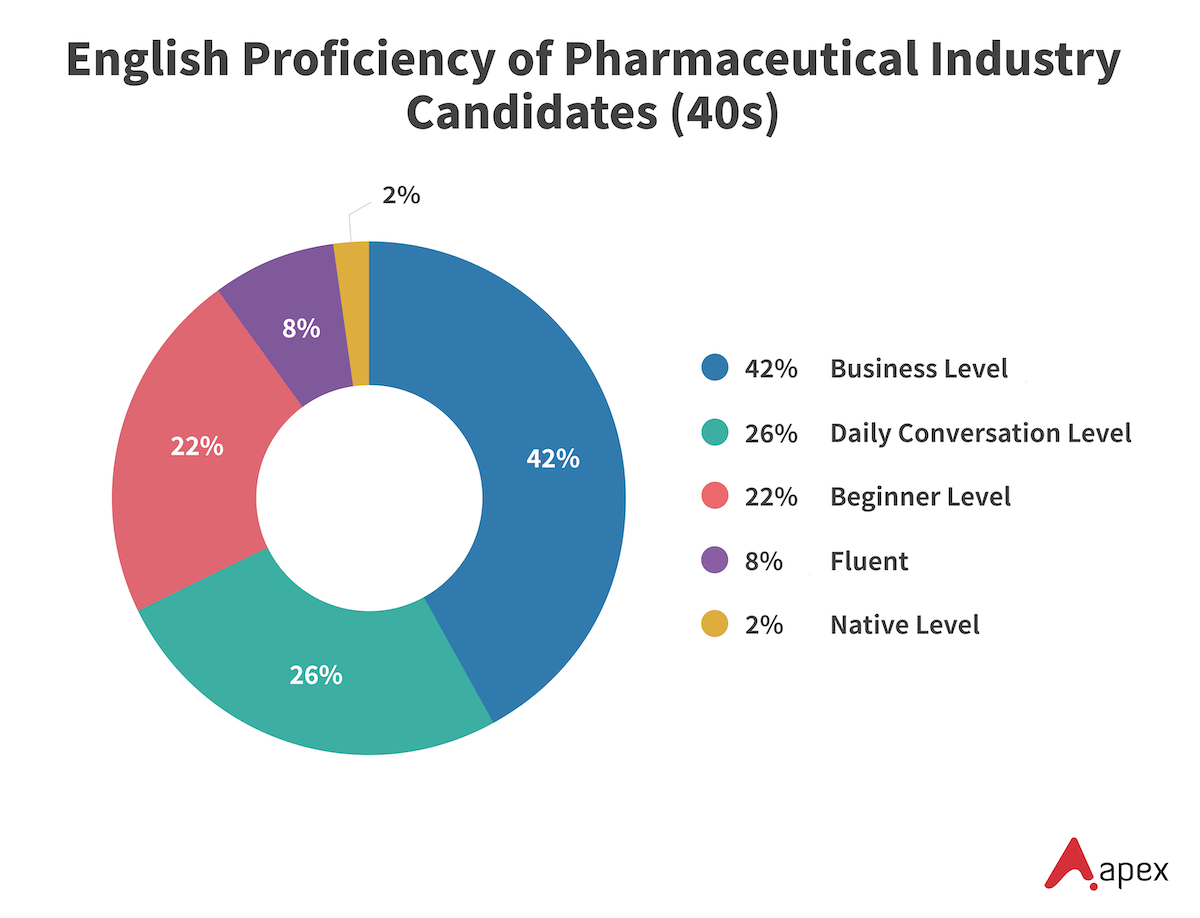
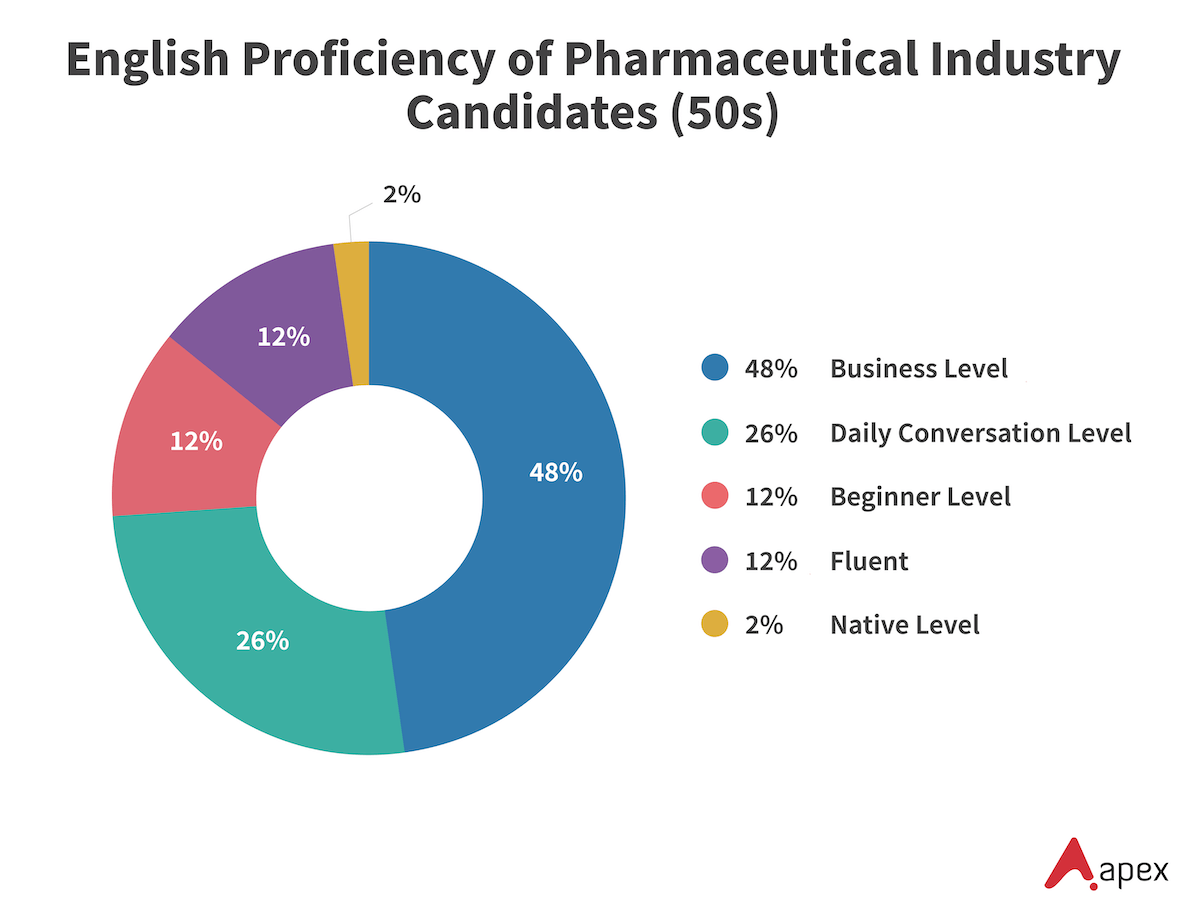
Successful Case Study
Below is an example of a successful bilingual recruitment completed by Apex. The position filled was APAC Market Access Associate Director at a global specialty pharmaceutical company.
• Client required a high-profile candidate with strong English proficiency and APAC-related work experience
• Extremely rare conditions, resulting in very few suitable candidates
Medical Device Industry Bilingual Recruitment and Hiring Insights
Hinako Yamamura
Medical Device Team Manager. Responsible for the Commercial Division. Selected as one of the company’s top consultants in 2023 and recognized in the Recruit Direct Scout Headhunter Rankings in 2022.
Common Challenges in Hiring Bilingual Talent
Balancing Sales Expertise with English Proficiency
In the medical device industry, especially for commercial roles, companies often seek candidates such as sales leaders with strong English skills or business directors with both sales management experience and fluency in English.
However, in Japan, sales professionals in this sector rarely use English in daily operations, aside from reading product materials. As a result, professionals who possess both advanced English ability and strong sales management experience are extremely limited.
Japanese subsidiaries may be open to prioritizing sales experience or product knowledge over language ability. In contrast, APAC and global offices often require higher English proficiency. Hiring from this narrow talent pool is unavoidable and typically results in higher recruitment costs.
Divergent English Skill Expectations Between APAC, Global, and Japan
Across many functions, APAC and global teams often expect stronger English proficiency than Japanese offices. A candidate who passes a one-on-one English interview may be considered business-level in Japan. However, global counterparts often look for the ability to handle complex, nuanced conversations in English.
This difference in standards frequently leads to rejection at final interview stages, even when candidates pass local screenings. The result is a limited pool of professionals who meet global expectations within the Japanese market.
Effective Strategies for Recruiting Bilingual Talent
Prioritize Sales Experience, English Proficiency, and Product Knowledge
Candidates who possess all three—sales management experience, product expertise, and strong English skills—are rare. It is essential to set clear priorities early. Define the required level of English and decide where flexibility is possible. A practical approach is to begin the search with ideal criteria for a set period, then reevaluate which requirements can be relaxed.
Use Recruitment Agencies to Align Expectations
Educating APAC and global stakeholders on Japan’s hiring environment can reduce friction. Apex often supports HR teams by briefing overseas offices on local hiring challenges and the realistic costs of recruiting bilingual talent.
Specialized agencies provide detailed market intelligence, including salary benchmarks and candidate availability for specific roles. This helps companies make informed, timely hiring decisions.
Medical Device Industry Candidate English Proficiency by Age (Apex Data)
Apex offers a diverse range of bilingual medical device candidates across various proficiency levels and age groups, helping companies efficiently match specific hiring needs.
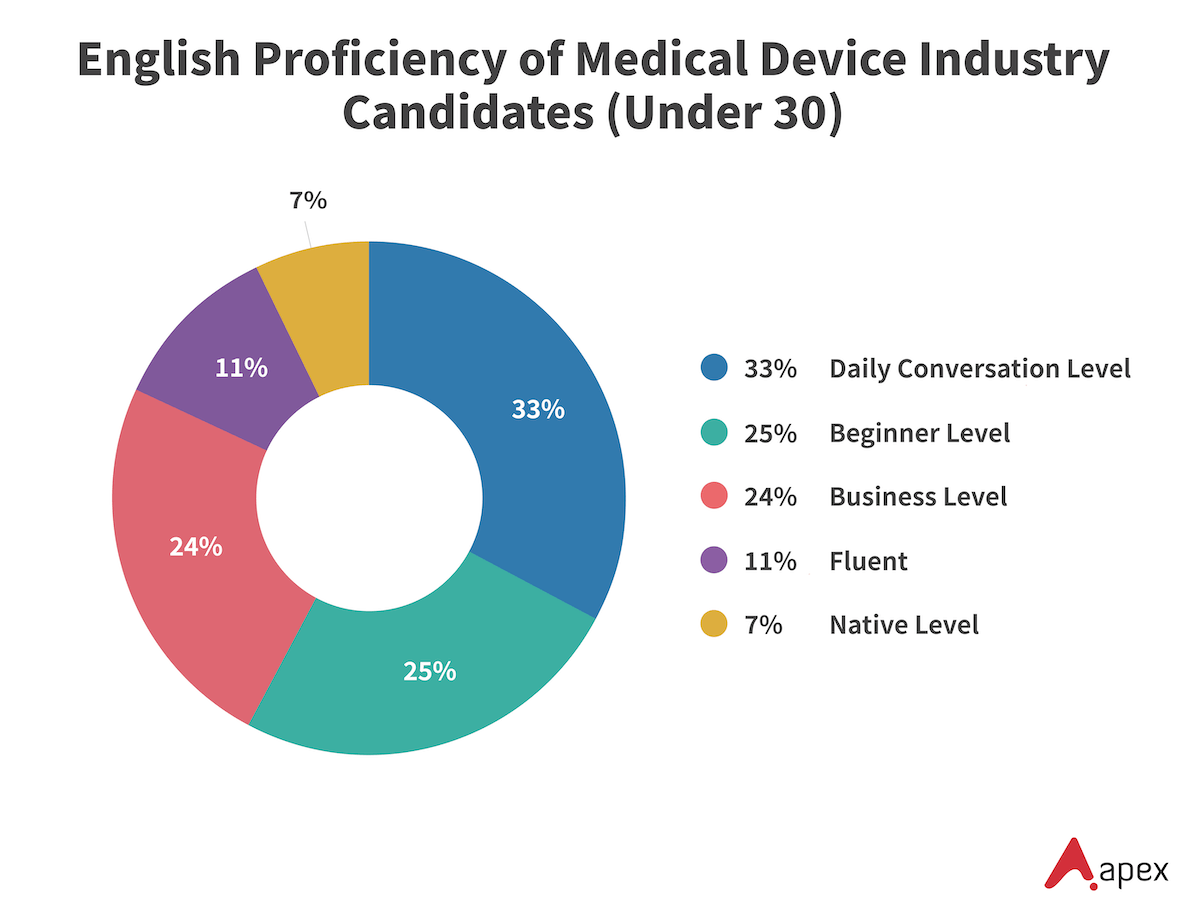
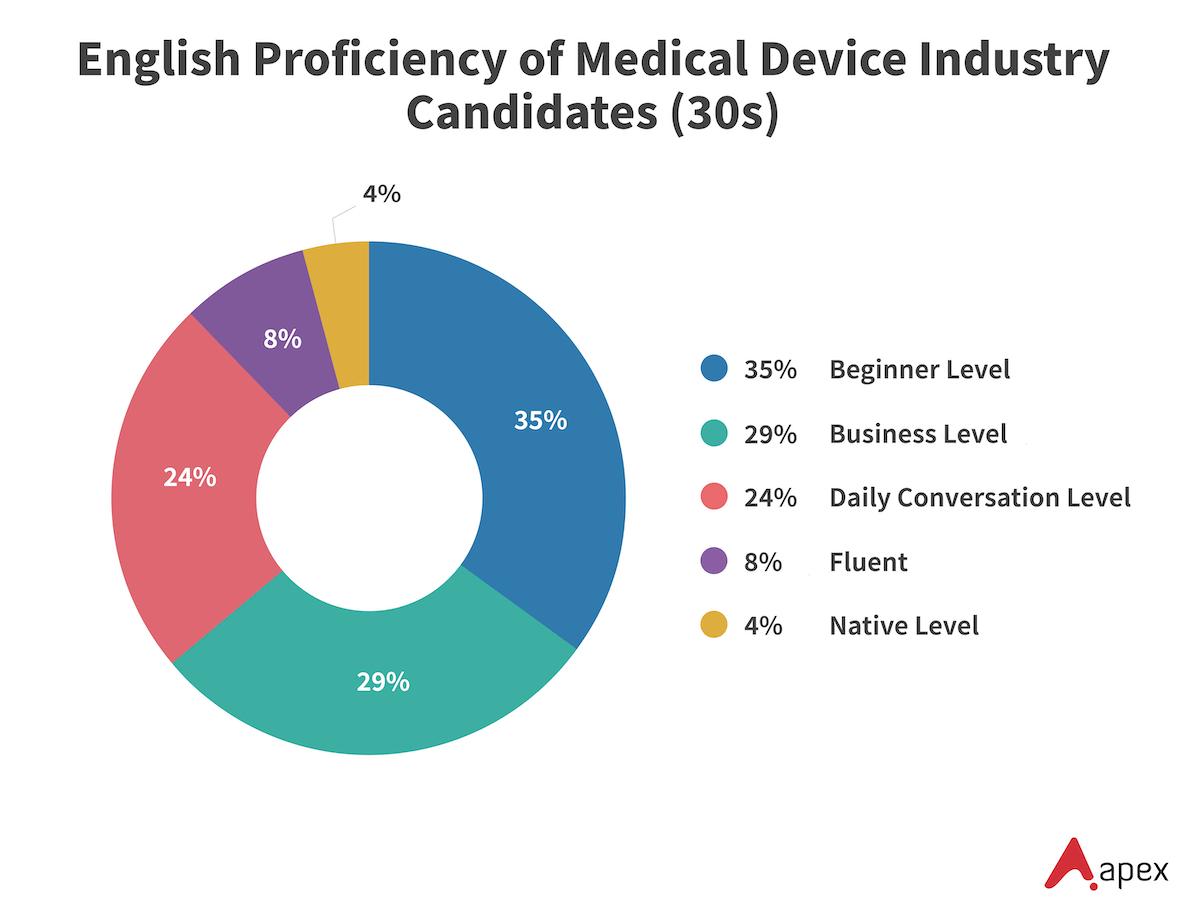
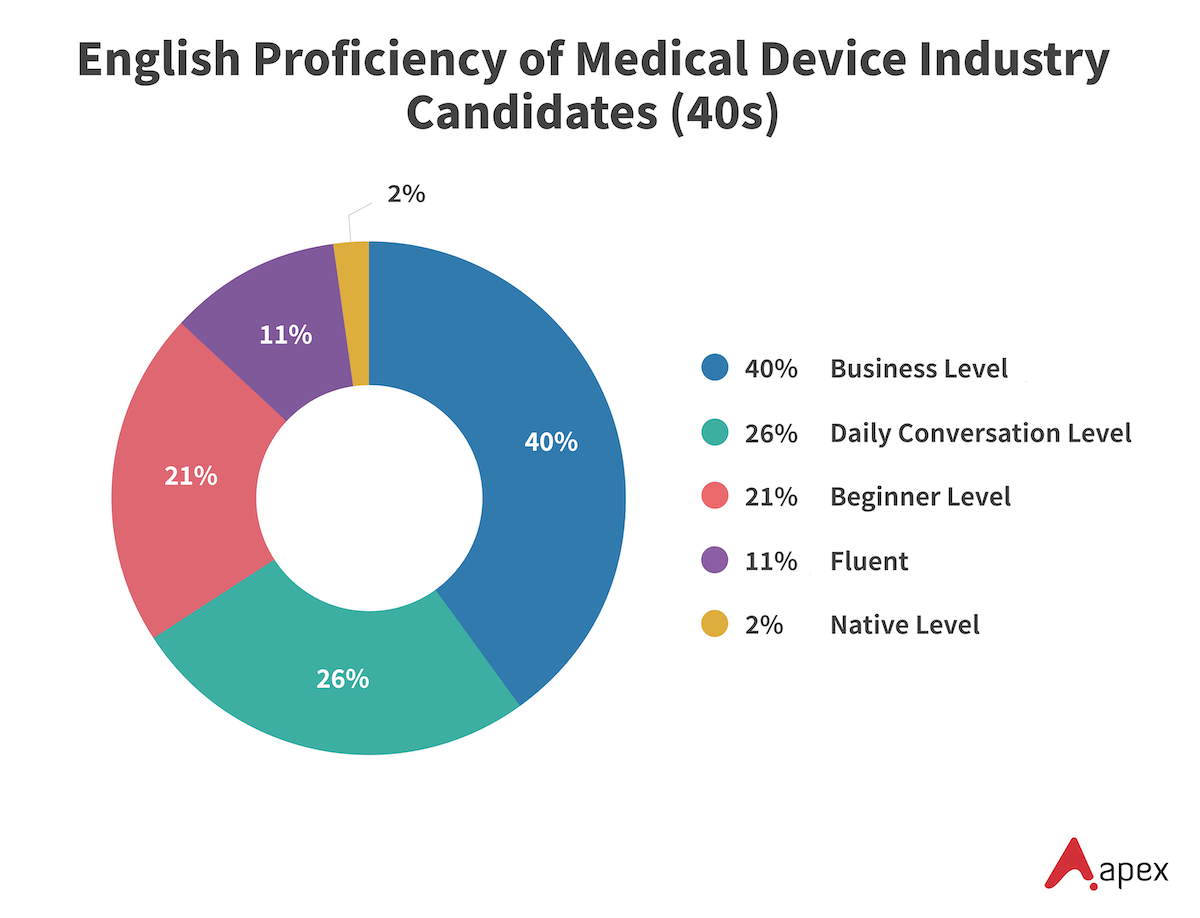
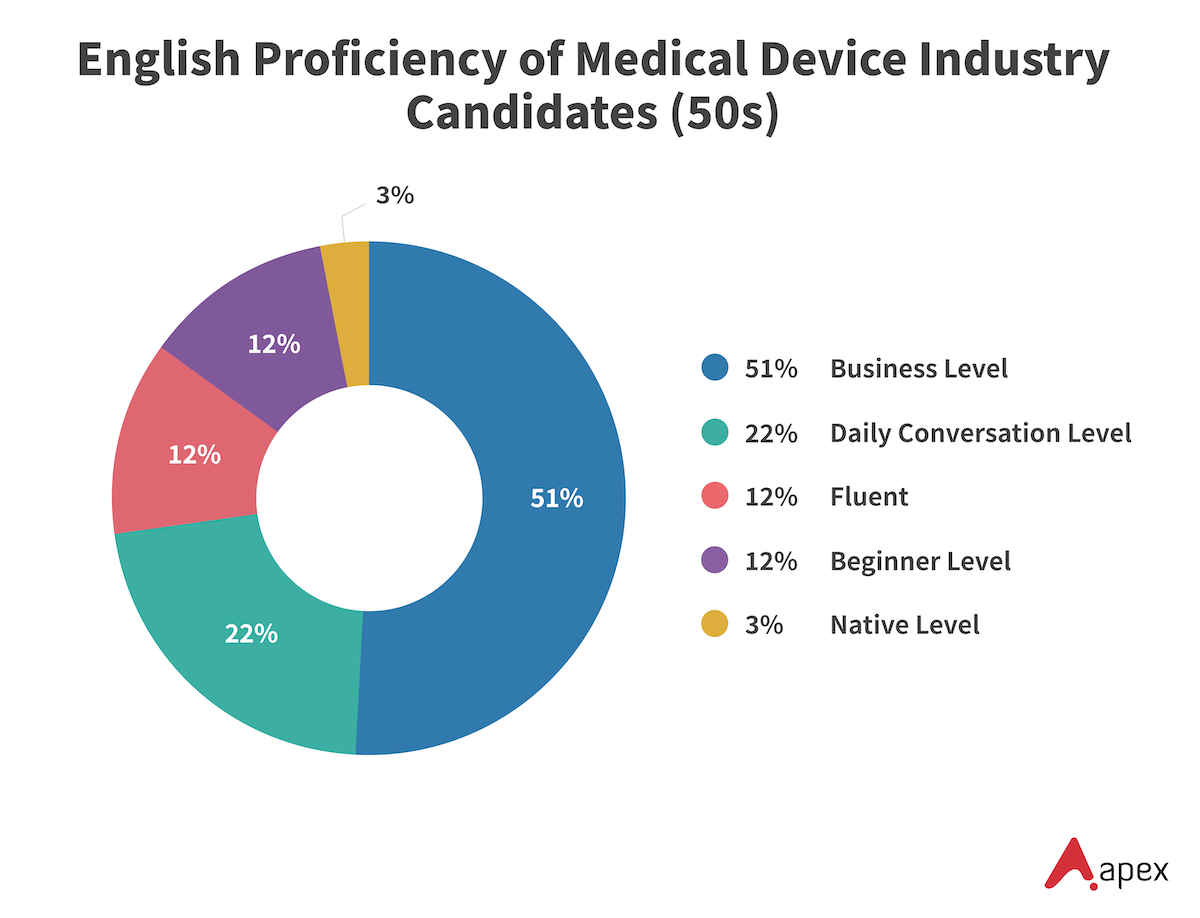
Successful Case Study
Below is an example of a successful bilingual recruitment completed by Apex. The position filled was Business Director at a global medical device manufacturer.
• Highly ambitious business development leader required for a newly created position
• Desired candidates with strong business English skills capable of working with global headquarters
IT Industry Bilingual Recruitment and Hiring Insights
Jumpei Shimamoto
Tech & Digital Team Principal Consultant. Specializing in consulting firms and cloud vendors. Selected as one of the company’s top consultants for three consecutive years, and received the Top Sales Award in 2024.
Common Challenges in Hiring Bilingual Talent
Highly Competitive Candidate Pool
Companies seeking bilingual professionals often require both advanced technical expertise and strong English ability. In many cases, English remains a strict requirement rather than a flexible preference. As a result, competition is intense for professionals who meet both criteria.
Misalignment Between Job Appeal and Candidate Motivation
Job descriptions frequently highlight opportunities to use English, such as involvement in global projects. While this may attract candidates underusing their language skills, it is less compelling for those already working in international environments. To engage experienced bilingual professionals, the focus should shift to long-term growth, autonomy, and career advancement.
Effective Strategies for Recruiting Bilingual Talent
Share Long-Term Career Vision with Candidates
Communicate why bilingual talent is needed and how the role connects to the company’s global strategy. When candidates see a clear path for long-term growth, they are more likely to engage and stay. Early transparency about global goals also helps prevent mismatches after hiring.
IT Industry Candidate English Proficiency by Age (Apex Data)
Apex offers a diverse range of bilingual IT candidates across various proficiency levels and age groups, helping companies efficiently match specific hiring needs.
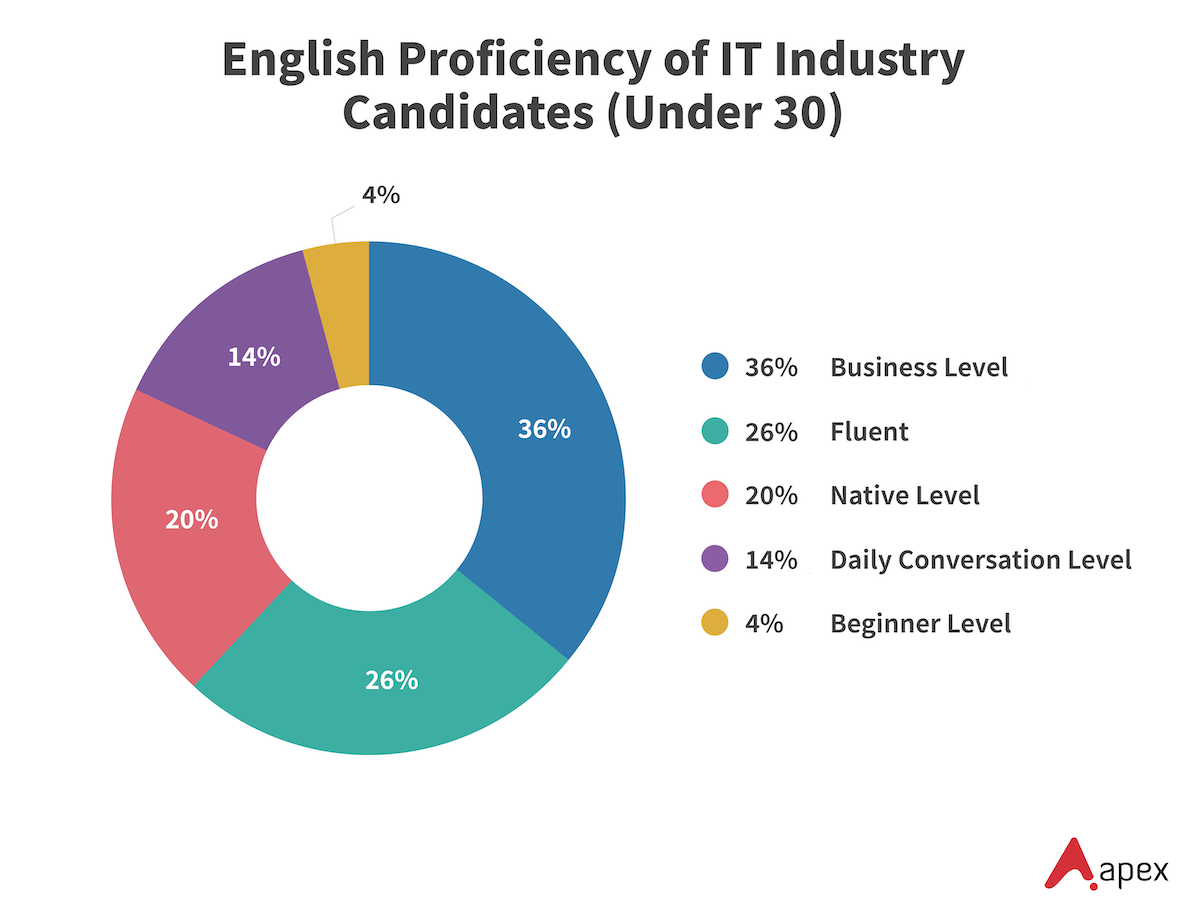
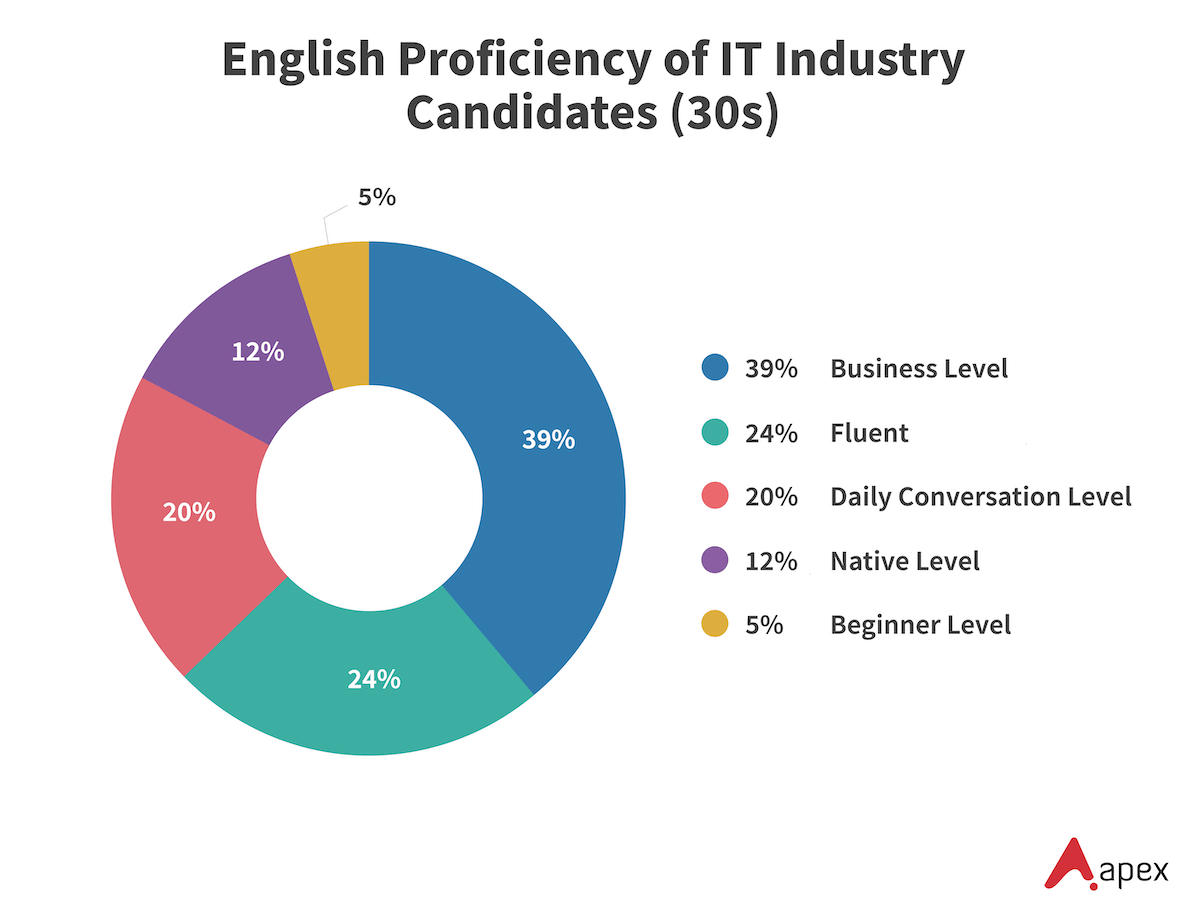
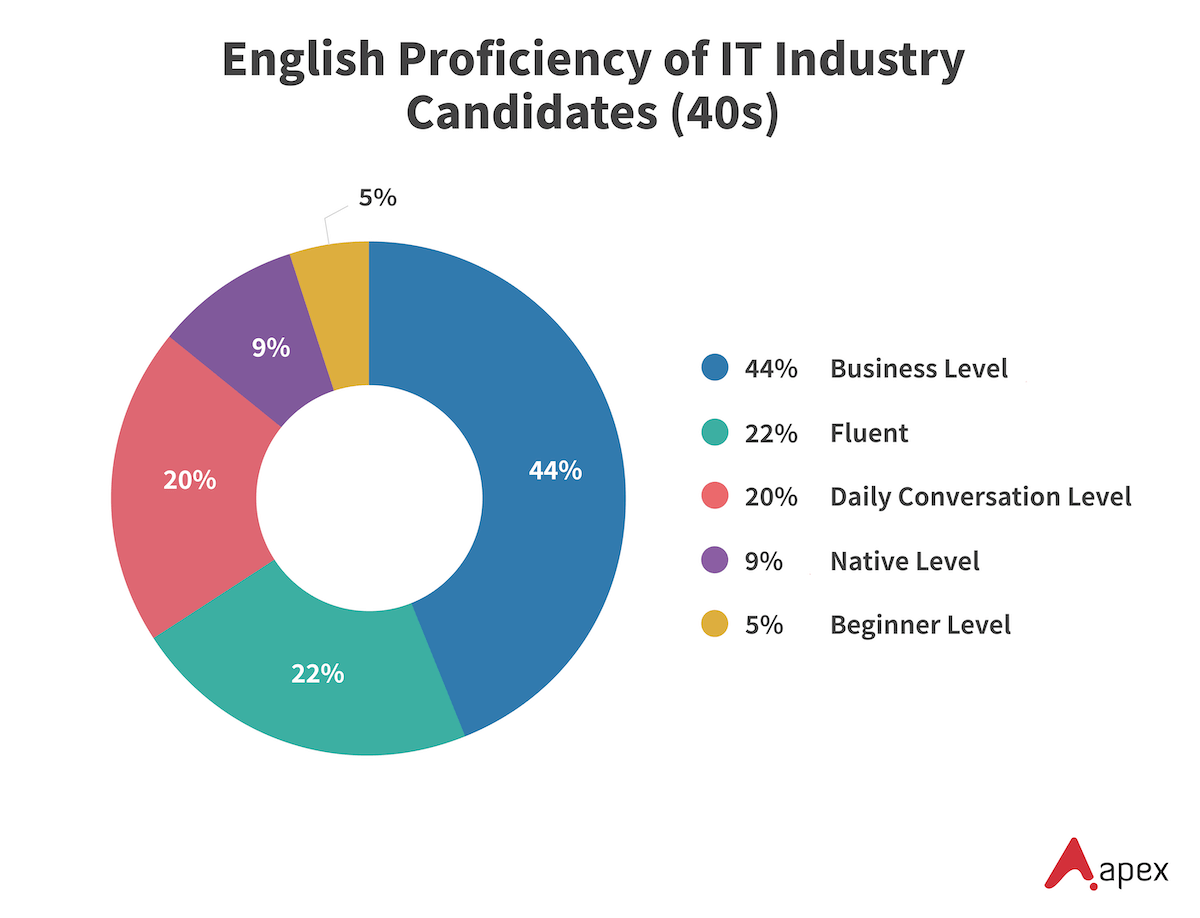
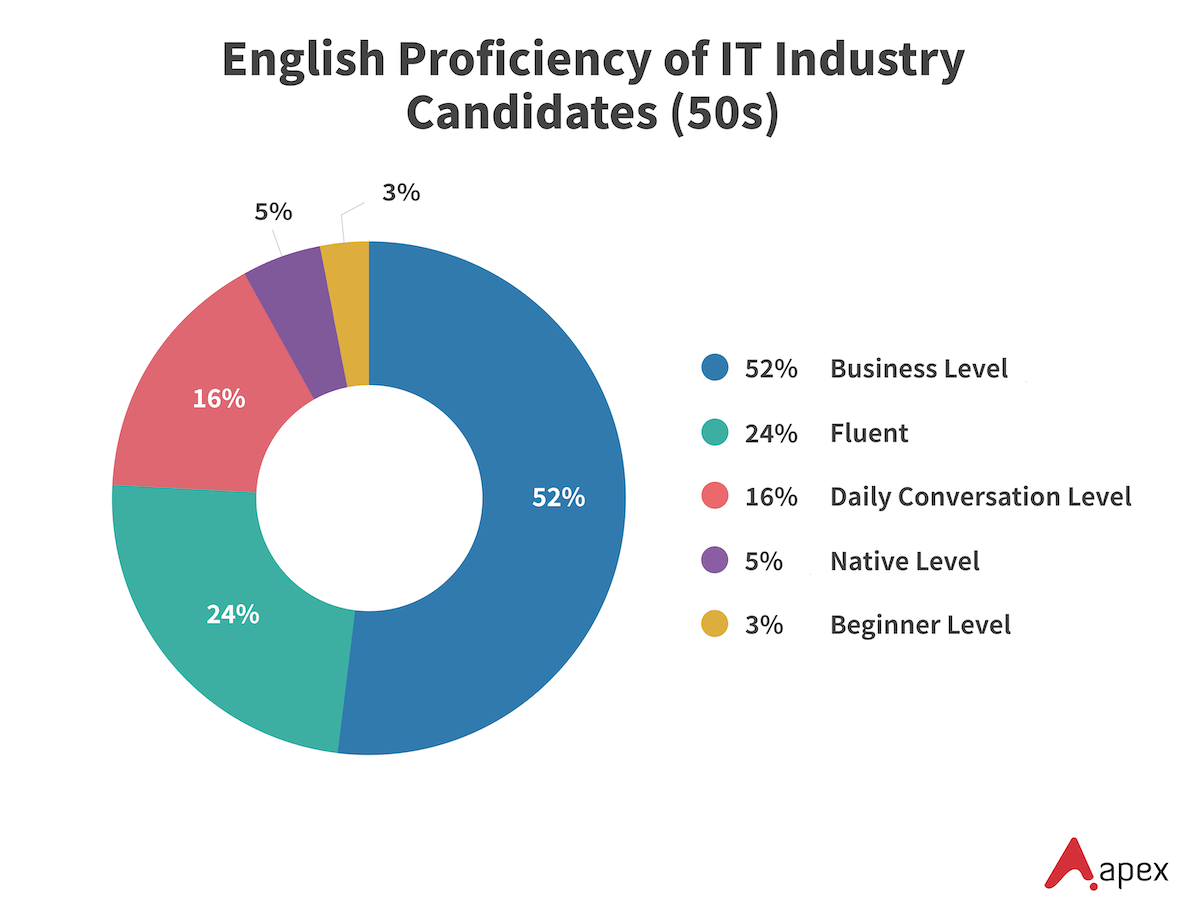
Successful Case Study
Below is an example of a successful bilingual recruitment completed by Apex. The position filled was Customer Success Director at a U.S.-based SaaS startup.
• Required candidates with fluent bilingual (Japanese-English) language ability
• Sought candidates with customer support experience in a SaaS company
Life Science Industry Bilingual Recruitment and Hiring Insights
Chihiro Hirai
Life Science & Diagnostics Team Principal Consultant. Specializes in key positions within the life sciences, biotechnology, and diagnostics industries. Selected as one of the company’s top consultants for three consecutive years, and received the New Client Acquisition Award in 2024.
Common Challenges in Hiring Bilingual Talent
Conducting English Interviews for Sales Roles
The pool of English-speaking sales professionals remains limited. Unlike technical or marketing roles, sales positions often involve less practical use of English. As a result, candidates may struggle in English interviews. Some companies address this by including bilingual team members in the interview process to provide translation and support.
Defining Specific English Proficiency Requirements
To avoid mismatches, it is essential to clarify when, where, and how often English will be used. Close communication between hiring managers and HR ensures the required language level is understood and consistently applied.
Effective Strategies for Recruiting Bilingual Talent
Clearly define the expected English proficiency level based on actual job needs
Conduct short English screenings early in the process
Prioritize core job skills and provide language support after hiring if necessary
Life Science Industry Candidate English Proficiency by Age (Apex Data)
Apex offers a diverse range of bilingual life science candidates across various proficiency levels and age groups, helping companies efficiently match specific hiring needs.
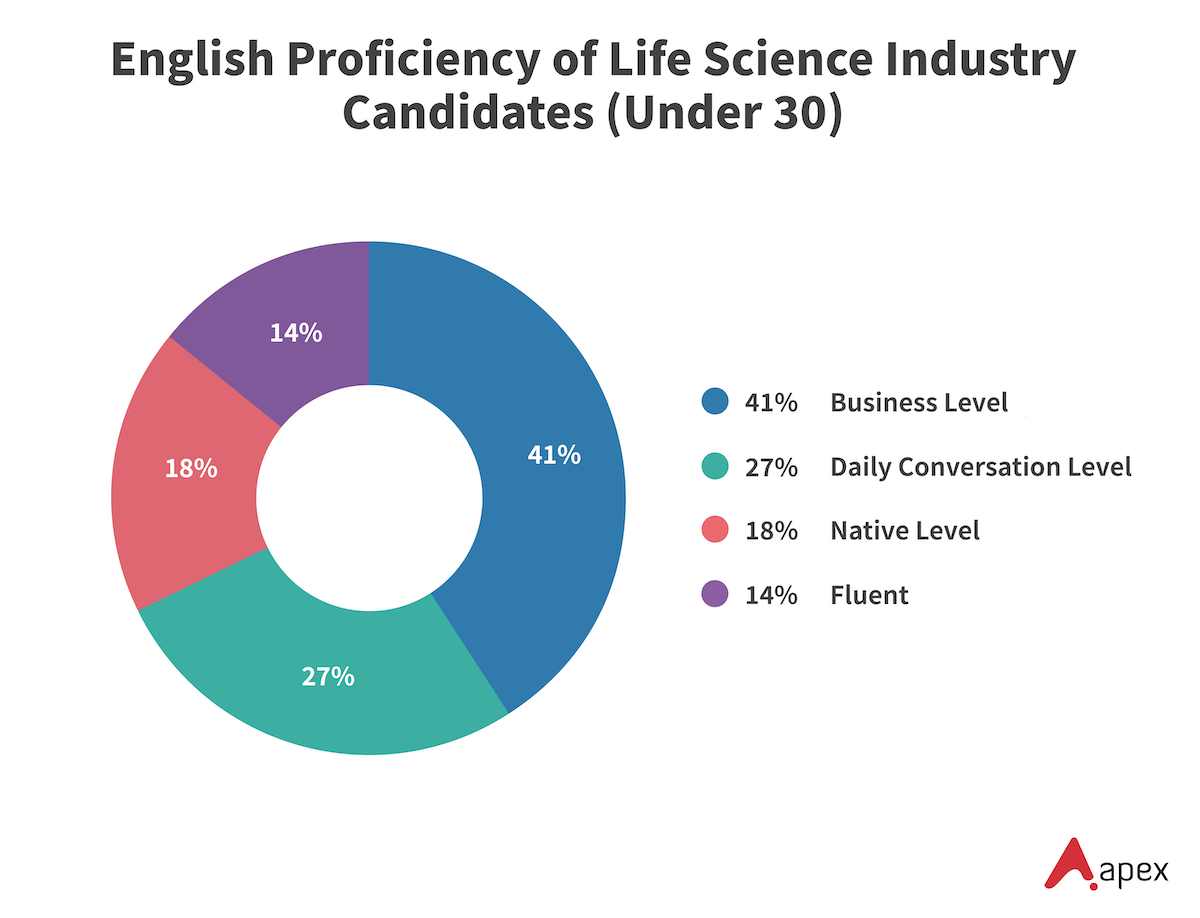
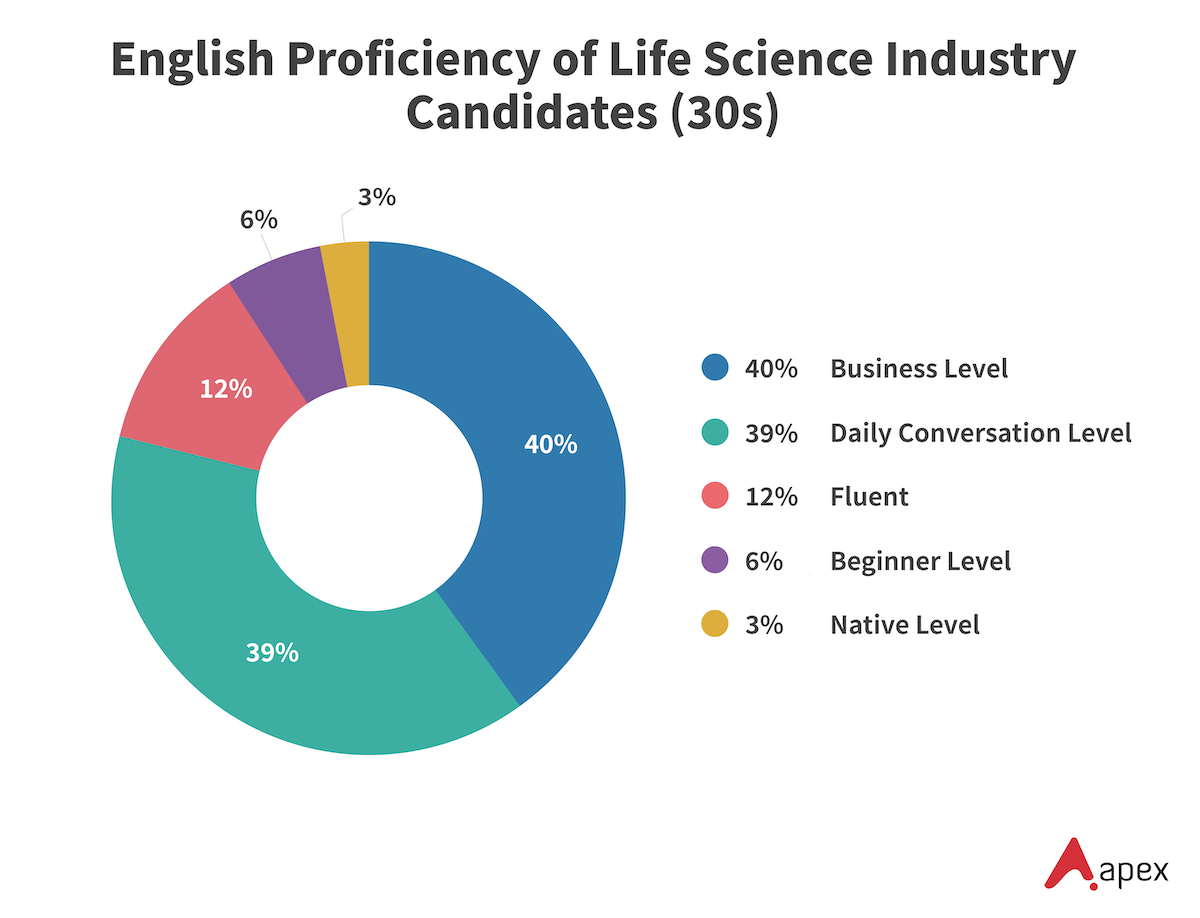
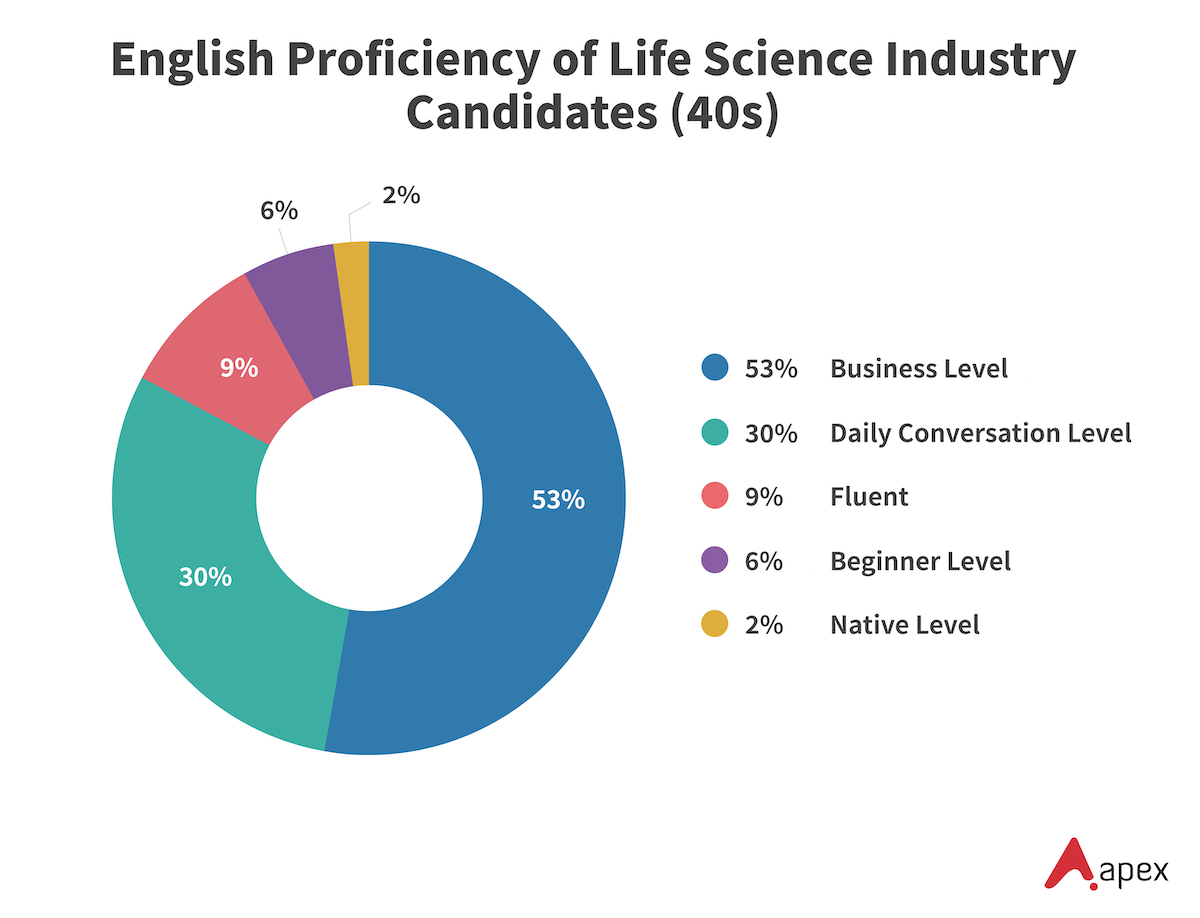
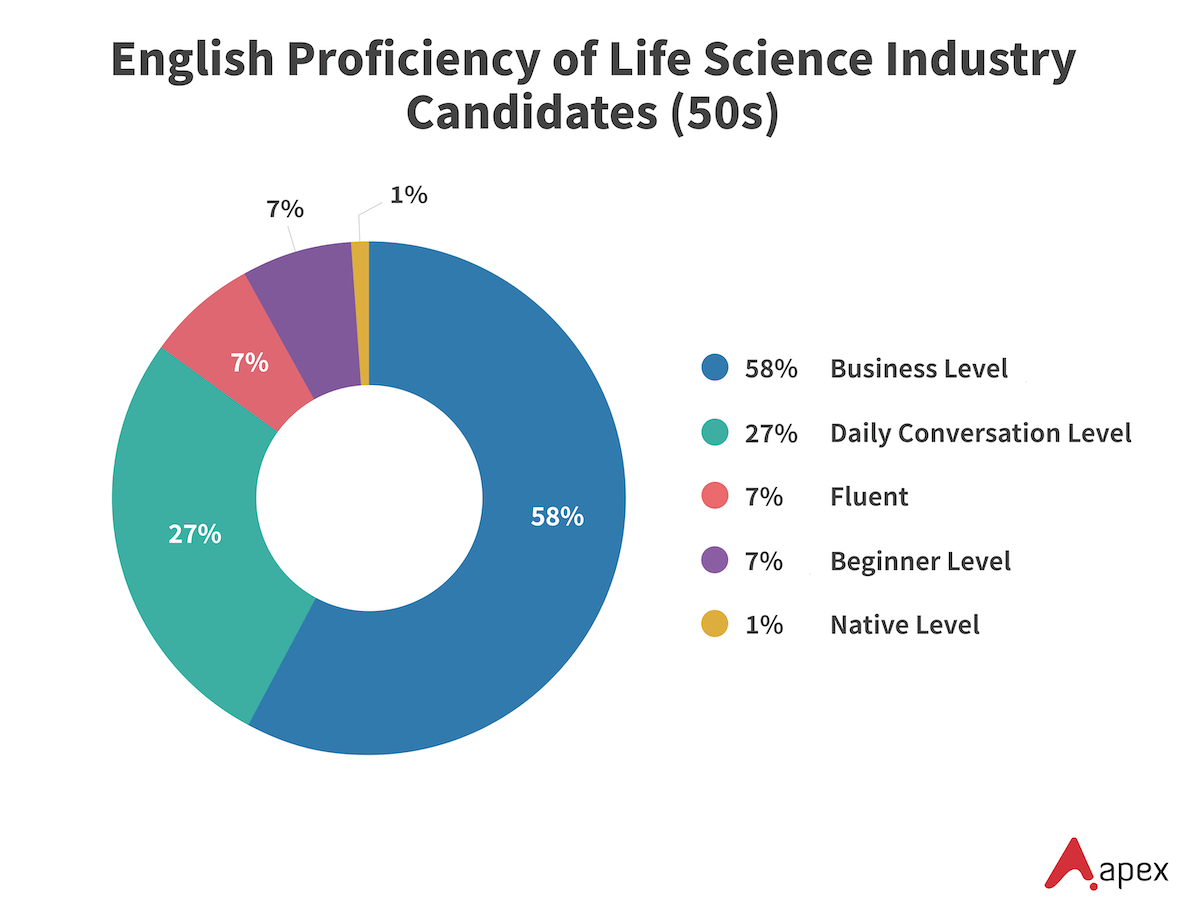
Successful Case Study
Below is an example of a successful bilingual recruitment completed by Apex. The position filled was Field Application Scientist at a global life sciences company.
• Required experience in one of the following: cell culture, cell biology, or molecular biology
• The client already had a subsidiary in Japan
Legal & Compliance Bilingual Recruitment and Hiring Insights
Hiroyuki Fukuhara
Legal & Compliance Team Principal Consultant. Responsible for all aspects of legal and compliance. Selected as one of the company’s top consultants in 2024.
Common Challenges in Hiring Bilingual Talent
Securing Budget for Legal Hires
Even major multinational companies often operate with lean legal teams in Japan, sometimes consisting of a single person reporting directly to APAC or global headquarters. In these roles, English proficiency is essential. Professionals who can manage all corporate legal matters independently while communicating fluently in English, regardless of licensing status, have become exceptionally rare. This limited supply has pushed salary expectations higher, creating serious budget challenges.
Defining English Requirements Clearly
For legal roles that do not require full legal authority, it is important to clarify how and when English will be used. Examples include reviewing contracts in English or participating in cross-border negotiations. Vague or overly broad requirements often lead to mismatched expectations and budget constraints, complicating the hiring process.
Effective Hiring Strategies for Bilingual Talent
Prioritize Speed and Partner with Specialized Recruitment Agencies
Bilingual legal and compliance professionals are in high demand, and competition is fierce once they enter the job market. A fast, flexible hiring process is essential to secure top talent.
Due to the technical nature of legal roles, general recruiters may struggle to evaluate market value accurately. Specialized recruitment agencies offer a clear advantage. They have access to high-caliber candidates who often avoid public job platforms such as LinkedIn or BizReach, as legal professionals tend to be more discreet in their job searches.
Leveraging these agency networks can increase hiring efficiency and reduce overall costs.
Legal & Compliance Candidate English Proficiency by Age (Apex Data)
Apex offers a diverse range of bilingual legal and compliance candidates across various proficiency levels and age groups, helping companies efficiently match specific hiring needs.
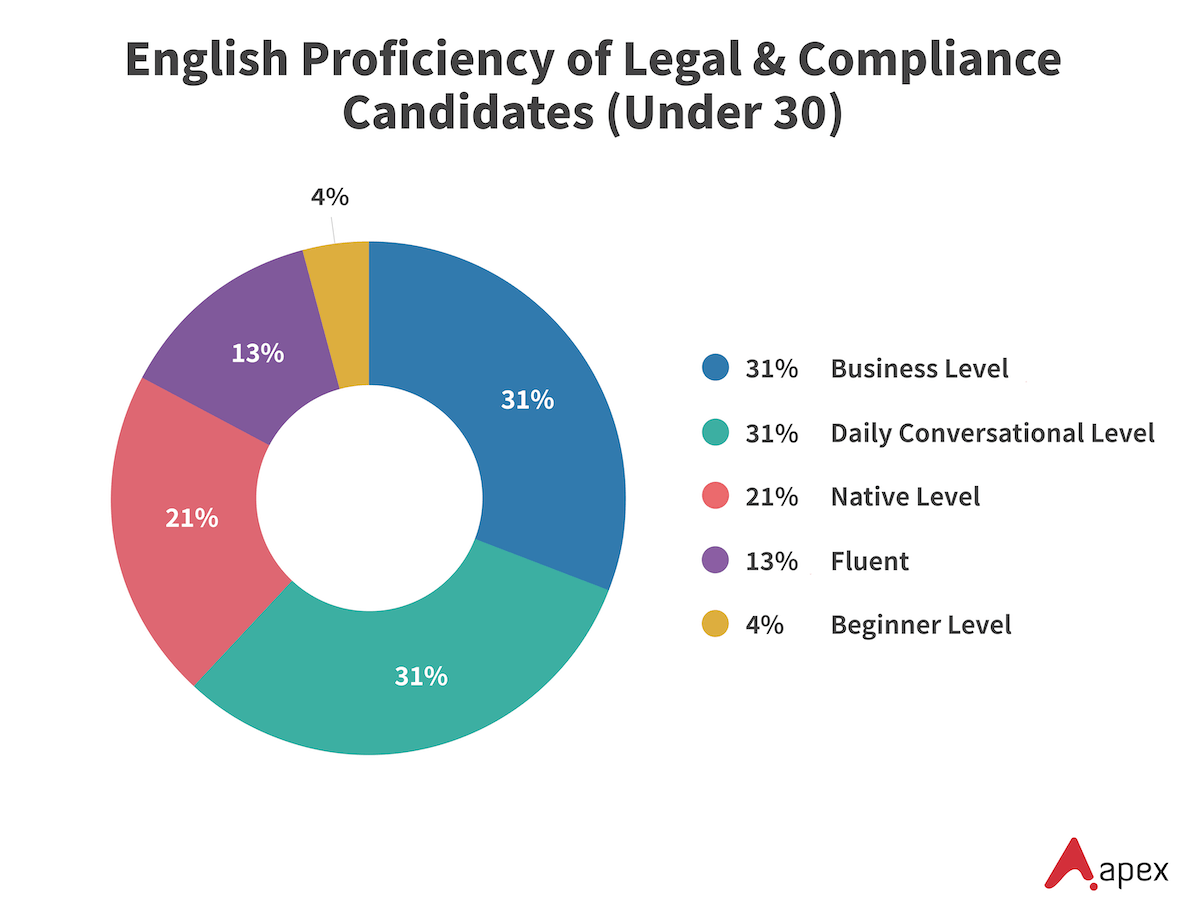
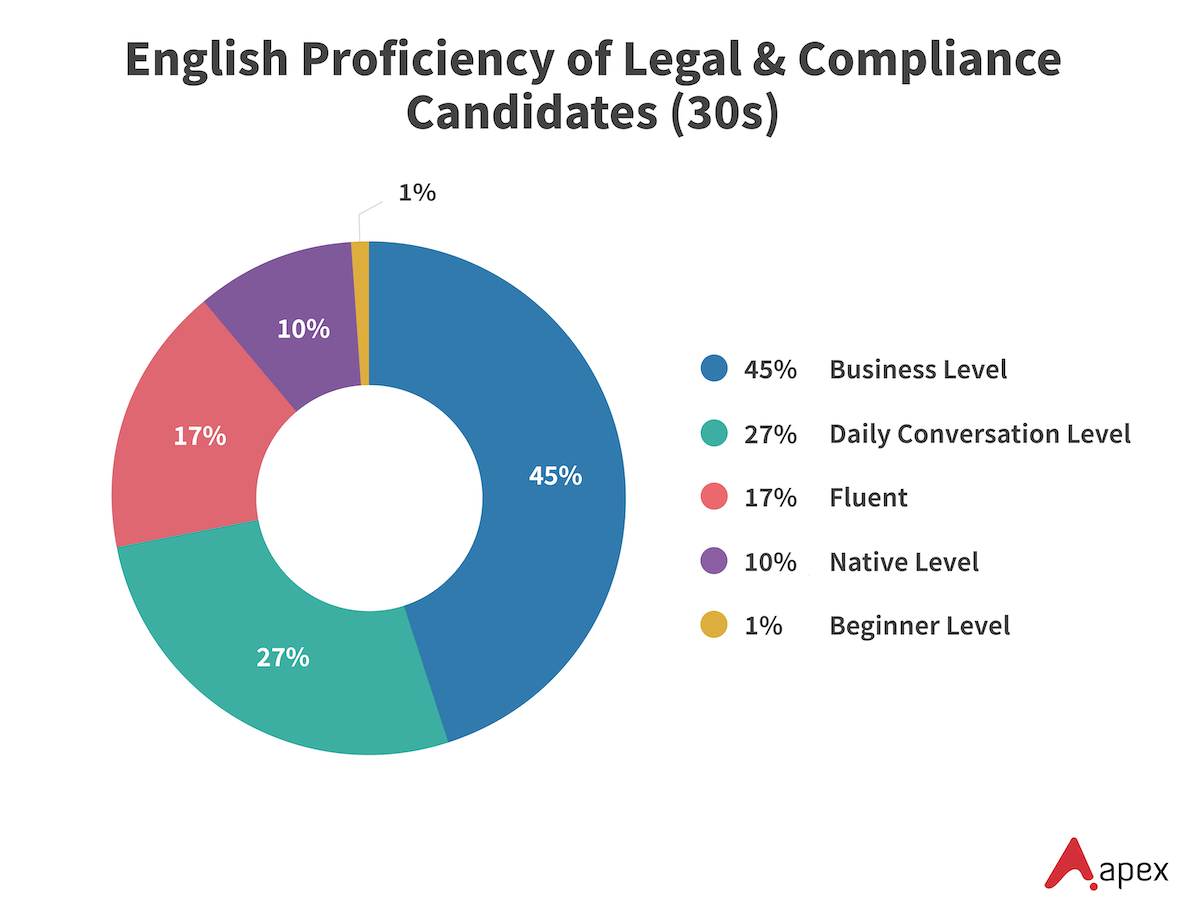
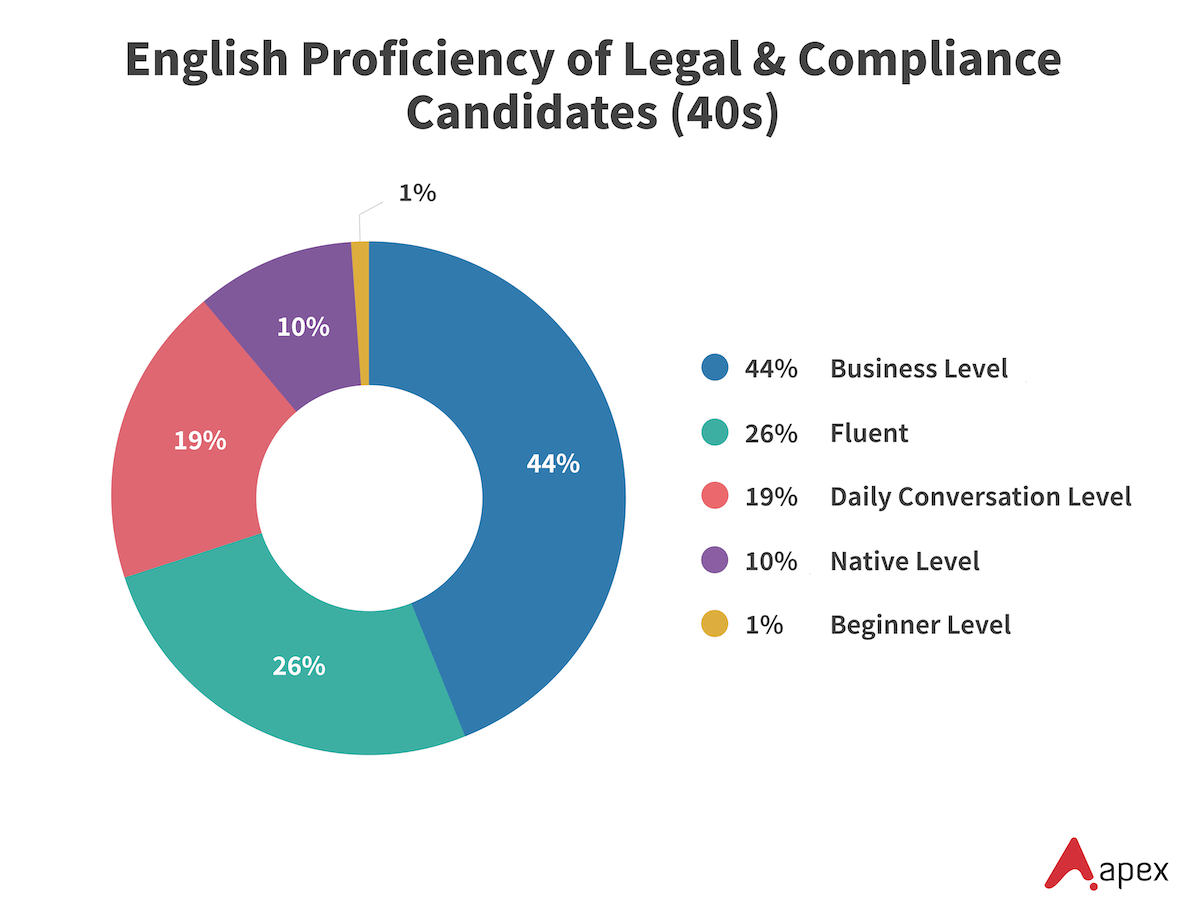
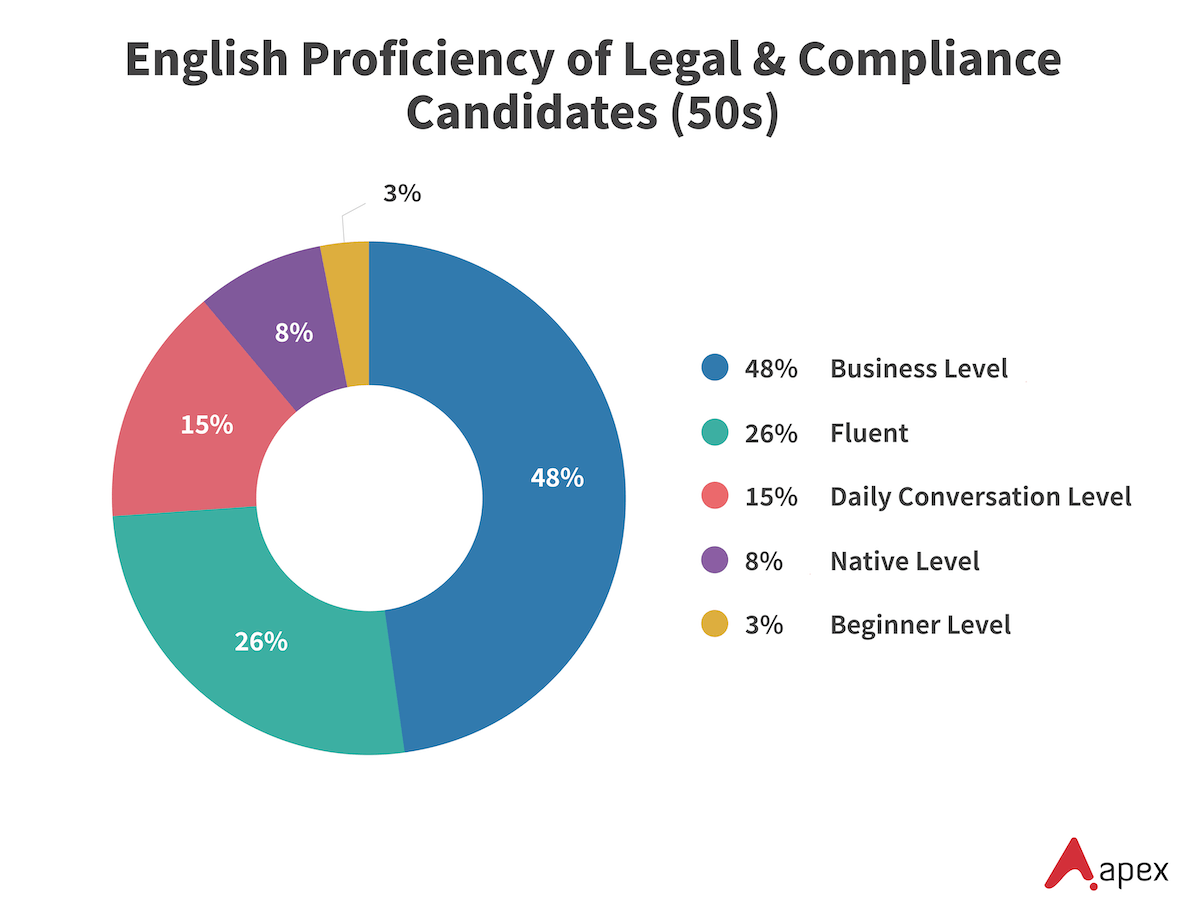
Successful Case Study
Below is an example of a successful bilingual recruitment completed by Apex. The position filled was Legal Counsel at a global healthcare company.
• Candidates were hesitant due to the position being with a well-known global company’s subsidiary in Japan, which could mean limited decision-making authority
Back Office Bilingual Recruitment and Hiring Insights (HR, General Affairs, Finance & Accounting)
Sirikul Siripiyavatana
Professional Services Team Senior Consultant. Specializes in HR and finance & accounting positions across the pharmaceutical, IT & technology, energy, legal, financial business, and consumer industries. Selected as one of the company’s top consultants in 2024.
Common Challenges in Hiring Bilingual Talent
Shortage of Senior Positions
While the number of senior-level bilingual professionals is rising due to Japan’s aging workforce, there are not enough managerial roles to match. This gap is especially visible in finance management. Some large healthcare companies are addressing this by relocating bilingual talent to global roles, which creates new openings in the domestic market.
Intensified Competition in Specialized Fields
In fields such as finance, demand for bilingual professionals is especially strong. As competition increases, companies must move quickly and remain flexible. Reducing the number of interview rounds is one effective way to secure top candidates before they exit the market.
Effective Hiring Strategies for Bilingual Talent
Conduct Oral Interviews in Both Languages
For bilingual positions, live interviews in both English and Japanese are essential. Bypassing online assessments and instead evaluating language skills through direct conversation offers a clearer view of real-world communication ability.
Back Office Candidate English Proficiency by Age (Apex Data)
Apex offers a diverse range of bilingual back office candidates across various proficiency levels and age groups, helping companies efficiently match specific hiring needs.
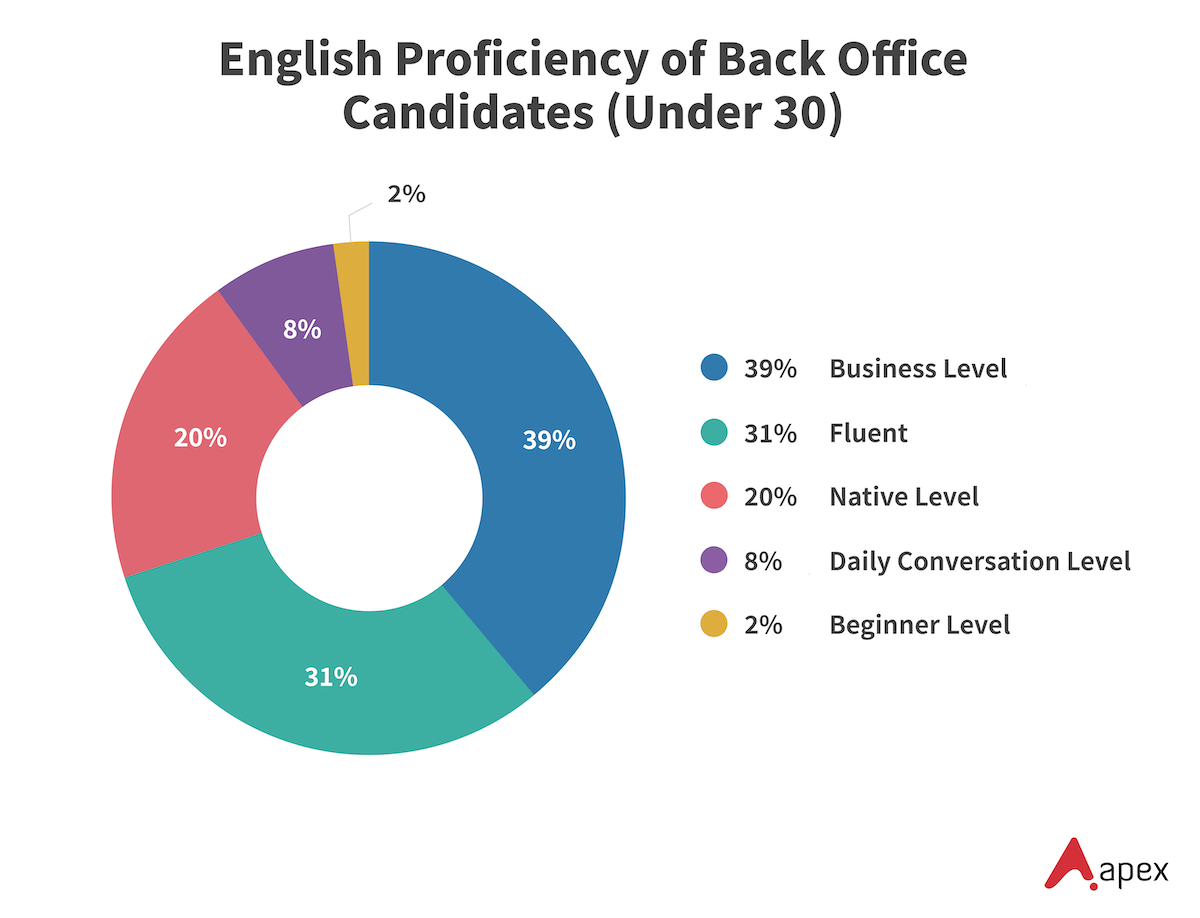
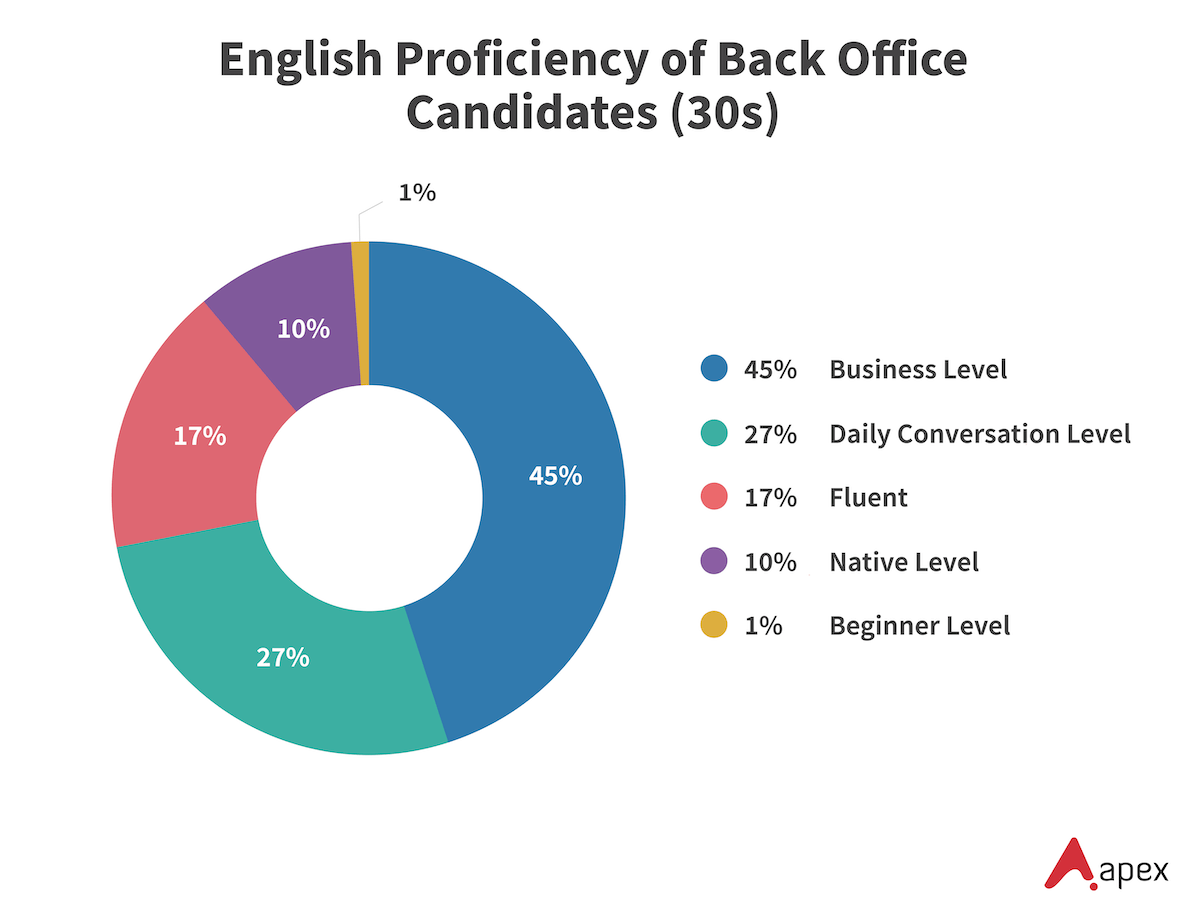
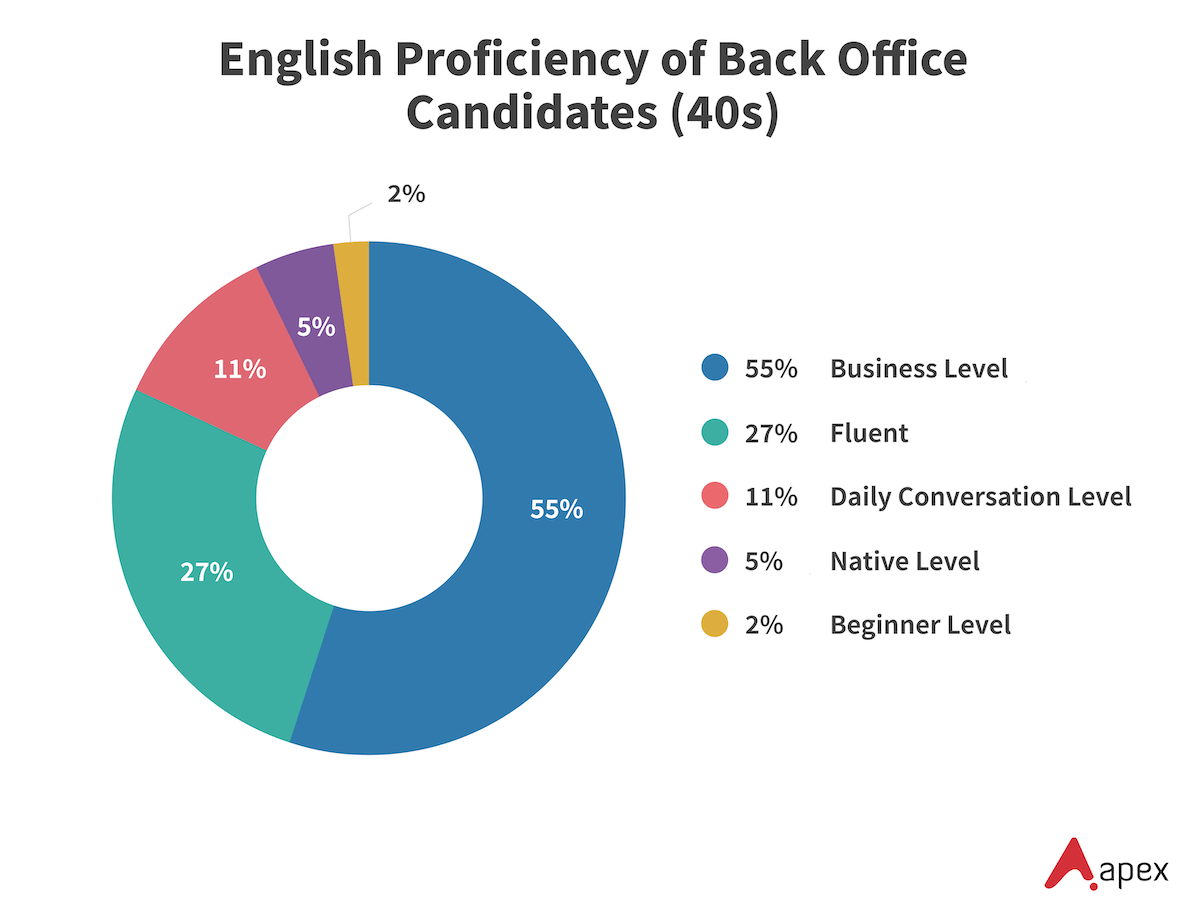
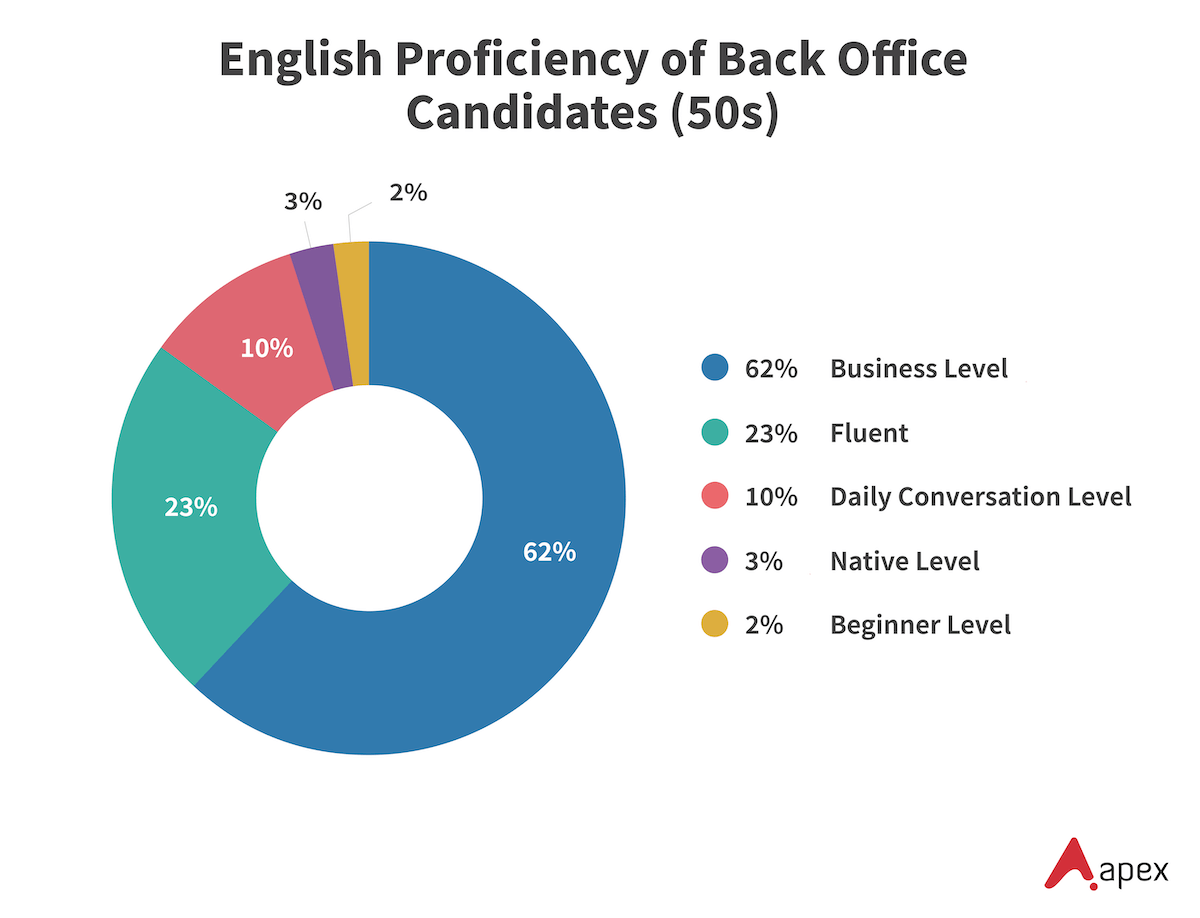
Successful Case Study
Below is an example of a successful bilingual recruitment completed by Apex. The position filled was Head of Finance at a global biotechnology company.
• Required a team-oriented individual who can also take initiative and act independently
Key Takeaways for Successful Bilingual Recruitment and Hiring
Understand the strong competition for professionals with both technical expertise and language proficiency
Distinguish between essential and negotiable requirements. Flexibility in age, location, and salary can widen the candidate pool
Use specialized recruitment agencies to help educate APAC and global stakeholders on Japan’s hiring challenges, salary expectations, and market realities
Emphasize role-specific value, such as career path and responsibilities, rather than focusing only on language usage
Clearly explain why bilingual skills are needed and how they support long-term global goals
Define what “bilingual” and “business-level English” mean in the context of the role, including when and how English will be used
Streamline the hiring process to move quickly and adapt to candidate expectations
Partner with agencies that specialize in niche markets to access hard-to-reach passive talent
Apex’s Strengths in Bilingual and Global Talent Recruitment
Apex specializes in placing bilingual and global talent with deep industry expertise, particularly in healthcare, IT, and legal and compliance. Our consultants provide end-to-end support, from defining hiring requirements to post-placement follow-up.
We regularly support the hiring of:
Professionals with specialized technical skills, including IT experts, engineers, and healthcare specialists
Candidates with advanced academic credentials or certifications such as MBA, PhD, JD, CPA, MD, or pharmacist licenses
Multilingual individuals with international backgrounds and multicultural experience
Executives and leaders suited for strategic and senior management roles
Apex provides end-to-end recruitment support, from redefining hiring criteria to ensuring long-term employee retention. Our executive search approach delivers candidates precisely matched to your needs. For companies seeking greater efficiency, we also offer RPO (Recruitment Process Outsourcing) solutions.
If you're looking for highly qualified bilingual professionals who can meet your business challenges, contact us today for a free consultation. Apex is fully committed to supporting your success.






